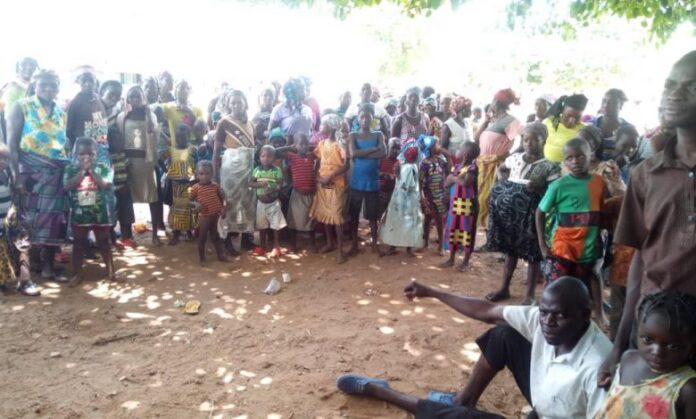Fleeing Militia Attacks: Shiroro Communities Stuck in IDP Camps, Unperturbed by COVID-19 Fears
The recent armed attacks in Shiroro Local Government Area forced villagers to flee their homes to get temporary shelter at the Internally Displaced Persons (IDPs) camps in Kuta to escape further attacks from the criminals.
The over 3,000 victims are camped in Central Primary School, Kuta, and Gwada Primary Schoolin Kuta, Shiroro Local Government Area. Central Primary School is at the centre of the town close to the main market and Jumma’a Mosque, while Gwada Primary School is on the outskirts of the town.
Yusuf Bala Kuta, the Local Government Protocol and Desk Officer of the Central School camp said “the camp houses people from Kwaki, Rummanci, Madalla, Bauchi, Kukoki and Bassa. Most of these people understand only their native language and Hausa. The residents of this camp are 2,569 people and majority of them are women and children.
“So far, we have 132 widows, more than 50 orphans and over 1,500 are children here.”
The people are scattered in different parts of the premises which has a borehole where they can fetch water for domestic use.
In the camp the inmates are separated according to their gender to avoid issues of sexual abuse, Yusuf said, and added that so far no incidences of sexual violence had been recorded.
“We stationed vigilantes at each side of the camp, so nobody will be allowed to cross the camp in the night talk less of having an affair with any woman.
“And the chairman is doing his best to reduce the suffering of these people. He recently constructed this borehole, provided us with food items and other equipment needed for daily activities,” he told HumAngle.
“ They were giving us three meals before but now we hardly get two meals. Most of us go into the town to do petty businesses and return to this camp in the evening,” an IDP countered in a separate interview with HumAngle.
Iliyasu, a resident of Kuta, said “the condition of the people can be better imagined than experienced. Food, water and health facilities are the major challenges facing the people, especially at the Gwado camp.”
The Gwada Primary school camp has 511 people from a Christian community called Kawuri in Kwaki-Tsukuba ward of Shiroro Local Government Area. It houses 100 women, 54 men and 349 children, majority of whom are orphans.
Read Also:
Yahaya Dogo, the traditional ruler of Kawuri, said “we are all Christians, no single Muslim in our community but our people do not believe it’s religious violence, it’s a violence by Fulani criminals. They destroyed our farmlands and we lost our animals to Fulani.”
The Chairman of Shiroro Local Government, Mallam Suleiman Chukuba, recently expressed concern over the condition of the Central School camp when officials of Niger State Emergency Management Agency visited.
He said, ‘In fact, the lingering insecurity in my local government, occasioned by the constant militia attacks in some remote communities of the council is already taking its toll on my very young administration.”
“The situation has almost prevented us from embarking on development efforts and programmes that can impact positively on the lives of our people at the grassroots. There is an urgent need for the government to ensure security is provided in the areas as no amount of relief materials can meet the needs of the people.’
HumAngle sighted an office marked as a clinic in the camp. It has one nurse and three community health workers. One of the workers in charge stated that the government set up the unit for emergency response “but you know the drugs and other facilities are not enough to take care of these people.”
The security situation in the camp is relatively stable with vigilantes in-charge. Dan Baba (not his real name) said “the camp is well secured under our watch though previously the camp suffered several attempts of attack and a significant number of spies were captured here. They were here with the intention to attack us.”
Commenting on the vigilante group’s relationship with the military and other security agencies in the community, Baba said, “you know, we always find an issue with them, even when the militia killed three of our people they blocked us from entering the bush, we actually don’t know their problem.”
Some people in the IDPs camps said there was a need for peace and investment in telling their stories and appealed to the media to assist by reporting their tragedies so the government would take the fight more seriously.
Asked about the people’s experience with the COVID-19 outbreak, the traditional ruler of Kawuri Kukoki said, “what we are going through will not allow us to see the corona, many have been raped, killed, they come to us every day attacking us, so why will we bother on the so-called virus, our own virus is the militia group.
“For us to ensure that people practice the regular hand washing, we need to have hand washing stations and soap installed and distributed at every strategic location, including the two camps.”
However, Yusuf said the government had provided the necessary facilities in the camps but “people refuse to observe the social distancing, we know asking them even to believe with the existence of the virus is another challenge.
“Most of them do not believe in the existence of the virus, we always fight with them once we talk about facemasks and social distancing. The only thing they obeyed for a short period was the hand washing but now they are not taking any measures here.”
Credit: HumAngle




